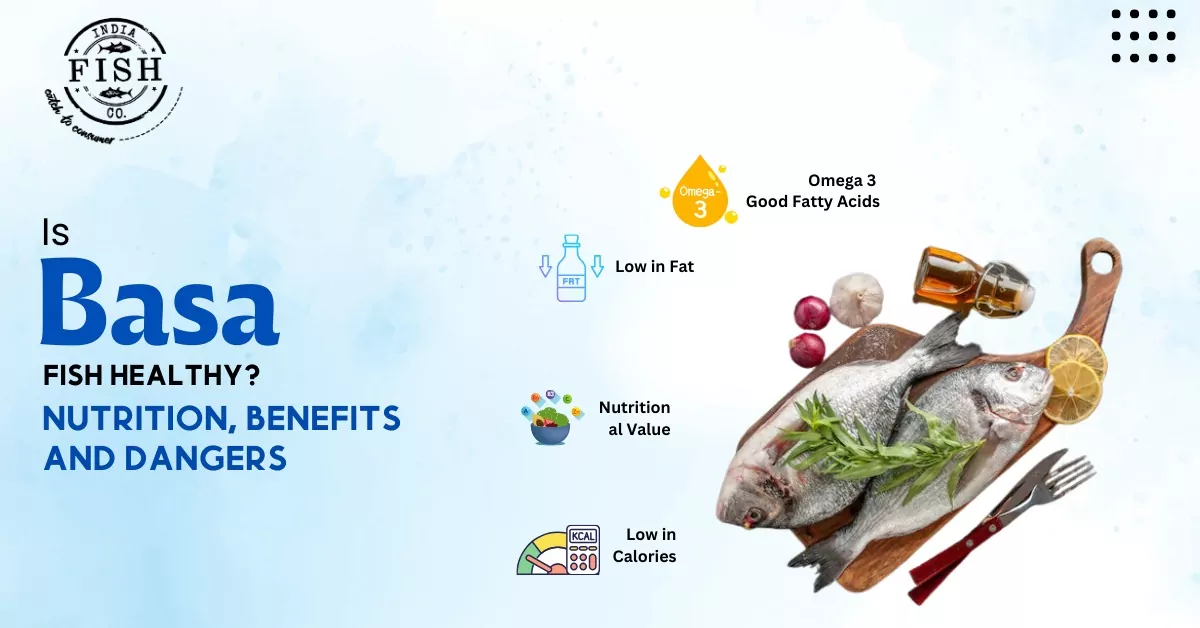Basa fish, also known as Pangasius or Pangash, has become increasingly popular, especially in countries like India, where seafood enthusiasts are always on the lookout for delicious and nutritious options. But what exactly makes Basa fish a hit among seafood lovers? Is it truly as healthy as it’s made out to be? Let’s dive into the nutrition, benefits, and potential dangers of Basa fish.
What is Basa Fish?
Basa is a type of catfish, characterized by its broad, flattened head and deeply forked tails. Often referred to as “Pangash” in India, Basa has a distinctive appearance, with barbels that resemble cat whiskers. The meat of Basa is white to off-white, with a tender flake and thinner fillets, making it a versatile option for various recipes. It’s moist, sweet, and mild-flavored, with tender white flesh that’s perfect for everything from curries to grilled dishes.
Nutritional Profile of Basa Fish
Basa fish is not only tasty but also packed with essential nutrients that can contribute to a healthy diet. Here’s a breakdown of the key nutritional components:
- Protein: Basa fish is an excellent source of high-quality protein, which is essential for muscle repair, growth, and overall body maintenance.
- Omega-3 Fatty Acids: Although not as rich in omega-3 as some other fish, Basa still provides a decent amount of these heart-healthy fats.
- Vitamins: Basa is a good source of B vitamins, including B12, which is important for maintaining nerve function and producing red blood cells.
- Minerals: It contains essential minerals like selenium, which has antioxidant properties, and phosphorus, which is crucial for bone health.
- Low in Calories and Fat: For those watching their weight, Basa is a low-calorie and low-fat option, making it a great addition to a balanced diet.
Health Benefits of Basa Fish
Given its nutritional profile, Basa fish offers several health benefits:
1. Supports Heart Health
The presence of omega-3 fatty acids in Basa fish makes it beneficial for heart health. Omega-3s are known to reduce inflammation, lower blood pressure, and decrease the risk of heart disease.
2. Aids in Weight Management
Basa is low in calories and fat, making it a great choice for those trying to lose or maintain weight. Its high protein content also helps in keeping you full for longer, reducing the chances of overeating.
3. Boosts Immune System
The selenium found in Basa fish acts as a powerful antioxidant, helping to protect your body from oxidative stress and boosting your immune system.
4. Promotes Healthy Skin and Hair
Basa fish is a good source of essential fatty acids and vitamins that contribute to healthy skin and hair. Omega-3s, in particular, help keep your skin hydrated and may reduce the risk of skin issues like eczema.
5. Supports Bone Health
Phosphorus, a mineral present in Basa, is essential for maintaining strong bones and teeth. Regular consumption of Basa fish can contribute to better bone health, especially in older adults.
Potential Dangers and Considerations
While Basa fish has many benefits, there are some considerations and potential risks that you should be aware of:
1. Risk of Contaminants
Basa fish is often farmed in environments that may not have the strictest regulations, especially in some countries. This can lead to the presence of contaminants like heavy metals and toxins in the fish. It’s essential to source Basa from reputable suppliers who ensure that the fish is farmed in clean and controlled environments.
2. Lower Omega-3 Content
Compared to other fatty fish like salmon or mackerel, Basa has a lower omega-3 content. While it does provide some of these essential fats, if you’re looking to boost your omega-3 intake, you might need to include other fish in your diet as well.
3. Potential for Overfishing
Basa fish is popular and widely farmed, which raises concerns about sustainable fishing practices. Overfishing and environmentally harmful farming practices can have negative impacts on marine ecosystems. Choosing Basa from sustainable sources can help mitigate this issue.
4. Allergic Reactions
As with any seafood, there’s always a risk of allergic reactions. If you have a known allergy to fish or seafood, it’s best to avoid Basa and consult with a healthcare professional before trying it.
How to Include Basa Fish in Your Diet
Given its mild flavor and tender texture, Basa fish is incredibly versatile and can be used in a variety of dishes. Here are some ideas:
- Grilled Basa Fillets: Marinate the fillets with lemon juice, garlic, and herbs, then grill for a light and healthy meal.
- Basa Curry: Cook Basa in a coconut milk-based curry with spices like turmeric, cumin, and coriander for a flavorful dish.
- Basa Fish Tacos: Use grilled Basa as the main protein in your tacos, topped with fresh salsa, avocado, and lime.
- Baked Basa: Coat Basa fillets with breadcrumbs and bake until crispy for a simple yet delicious meal.
Conclusion
Basa fish is a nutritious and delicious option for seafood lovers, offering several health benefits, particularly for heart health, weight management, and immune support. However, it’s important to be mindful of potential risks like contaminants and lower omega-3 content. By sourcing Basa from reputable suppliers and incorporating it into a balanced diet, you can enjoy its many benefits while minimizing any dangers.
FAQs
1. Is Basa fish safe to eat every day?
While Basa fish is generally safe to eat, it’s best to consume it in moderation due to potential contaminants. Include a variety of fish in your diet to get a broader range of nutrients.
2. Can I eat Basa fish if I’m pregnant?
Pregnant women should be cautious about consuming fish that may contain high levels of mercury or other contaminants. It’s advisable to consult with a healthcare provider before including Basa fish in your diet during pregnancy.
3. How does Basa fish compare to other types of fish nutritionally?
Basa is lower in omega-3 fatty acids compared to fatty fish like salmon, but it’s still a good source of protein and other essential nutrients. It’s a great option if you’re looking for a mild-flavored, low-calorie fish.
4. Where can I buy high-quality Basa fish?
It’s important to buy Basa fish from reputable suppliers who follow strict farming and processing standards. India Fish Co. offers premium quality Basa that is sourced responsibly, ensuring you get the best product possible.
5. What is the best way to store Basa fish?
Basa fish should be stored in the refrigerator and consumed within a couple of days. If you need to store it for longer, freezing it in an airtight container is recommended.


